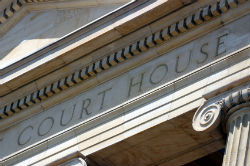Many people believe that student loans cannot be discharged (eliminated) in bankruptcy but that is not accurate. Student loans can be discharged if there would be an “undue hardship” on the person if not discharged. Under court opinions, that means the person could not maintain a “minimal standard of living” if loan payments were made and the financial situation is unlikely to change. “Minimal standard of living” means the person has to be able to pay essentials such as rent, food, utilities and similar items. Although it’s technically not required, courts are likely to find this for a person who is permanently disabled or is suffering from a medical condition that’s not likely to improve in the foreseeable future. A final requirement is that the person have made a “good faith” effort to repay the loan. If a student loan has only recently been obtained or if there is no history of loan payments having been made the loan is not going to be dischargeable.
It is possible to get a partial discharge of student loans. If the person has several loans, and only one is recent, the older ones might be dischargeable. Similarly, if the debtor is able to make some payment toward the student loans but not all and still maintain a “minimal standard of living”, the amount that can’t be afforded could be discharged. It is up to the judge who hears the case whether to partially discharge student loans. There is no requirement that the judge do so.
Unless the lender or servicer for the loan agrees in writing that a student loan is dischargeable, the only way to get it discharged is by filing an “adversary proceeding” in the bankruptcy. An adversary proceeding is a separate lawsuit and rarely, if ever, will be included in what your attorney agrees to do for the cost of filing the bankruptcy itself. The attorney’s fees for an adversary proceeding can be very expensive. In fact, most people who are struggling to maintain a “minimal standard of living”, have no realistic chance of paying those fees if done on a standard, hourly basis. That means it’s really important to talk to several attorneys before hiring one for your bankruptcy if you want the attorney to try to discharge your student loans.
If you live in Sonoma County, California, and have specific questions regarding eliminating student loans through bankruptcy, call (707) 543-8530 today or fill out our online form to schedule a FREE consultation with Attorney Thomas Jeffrey.




